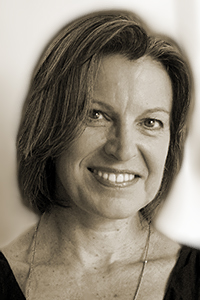
Claudia Emerson (1957–2014)
With great sadness we at Blackbird note the death of our dear friend Claudia Emerson. Words cannot express how much we will miss her company and her spirit. To quote Kathleen Graber, director of creative writing in VCU’s Department of English:
Claudia Emerson was unquestionably a poet of the highest caliber and achievement, a poet whose work needs no one to speak on its behalf. When I think of her poems, I think of the marriage of astute, honest observation and fierce urgency to remarkable grace, and I think now that is how someone might also describe her character. In this way, she continues to give us an ongoing model of how to be fully alive and actively engaged in the world.
We invite you to remember Claudia Emerson and her work. The following poem, “The Ocularist,” was first published in Blackbird v12n1. Links to her work in the current and previous issues of Blackbird appear below.
The Ocularist
One of the earliest
eyes was found
with the ancient
corpse of a woman
in Persia, hers
made of gold
to resemble
a small sun—
iris and sclera
chased rays—
clear testament
not to the eye,
but to the light
that had been
made go out.
The later ones
crafted of glass
I studied
and practiced
for fire-blown
beauty, learning
another fragility,
vulnerability
to the body’s
heat, the way
glass shatters
inside the fleetest
fever. For
its give—
and forgiveness—
I worked then
in ivory-wax,
and after
perfecting the shape,
cloned with
paint an iris,
small blood
vessels from
filaments of red
silk, then sealed
the whole
beneath an acrylic
veneer—thin,
invisible. Mine
was always
the smaller
studio, the work
fine, lonely
as a jeweler’s,
my needs
the same—a window,
a lamp, lighted
eye loupe. Half-
sculptor, half-
illustrator, I
thought for
a long time
I was crafting
something place-
saving at best,
an orbit-
warmed imposter,
elegy,
implied
narrative of loss—
flying glass
or knife,
a thumb’s determined
gouge. But I
learned finally
to manipulate
the way light
played the sphere—
the pupil
seeming to dilate
from dusk or
desire—becoming
architect
not of form
but of function,
not of object
but of the seen-
self, enticing it not
to look away.
The patient’s
eye took with it,
after all,
only periphery
and the perception
of depth,
asides the truest
beholding has
never required.
So I aligned
the gaze
for the whole-sighted
world, that
it might find
some small figment
of itself
contained there, already in
the brain—
I could make it
believe—the fact
of what was
not there of no
matter at all,
the final
measure of an eye’s
worth, in fact,
its complete
disappearance—
and with it,
mine—into
the opposite
eye that was
such belief. ![]()
Claudia Emerson in this issue of Blackbird
Claudia Emerson in previous issues of Blackbird


